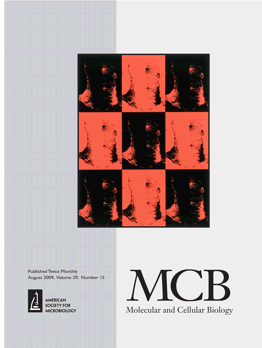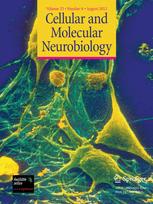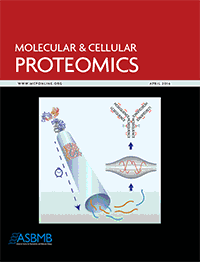Science & Society: A Journal of Marxist Thought and Analysis is a quarterly peer-reviewed academic journal of Marxist scholarship. It covers economics, philosophy of science, historiography, women's studies, literature, the arts, and other social science disciplines from a Marxist point of view. As well as covering social and political theory, it includes first-order historical research. The journal was established in 1936 and is published by Guilford Publications. The editor-in-chief is Julio Huato.

The Journal of Molecular Biology is a biweekly peer-reviewed scientific journal covering all aspects of molecular biology. It was established in 1959 and is published by Elsevier. The editor-in-chief is Peter Wright.

The International Journal of Mass Spectrometry is a monthly peer-reviewed scientific journal covering all aspects of mass spectrometry, including instrumentation and applications in biology, chemistry, geology, and physics. It was established in 1968 as the International Journal of Mass Spectrometry and Ion Physics and was renamed International Journal of Mass Spectrometry and Ion Processes in 1983, before obtaining its current title in 1998. It is published by Elsevier and the editors-in-chief are Julia Laskin and Zheng Ouyang.

The American Society for Biochemistry and Molecular Biology (ASBMB) is a learned society that was founded on December 26, 1906, at a meeting organized by John Jacob Abel. The roots of the society were in the American Physiological Society, which had been formed some 20 years earlier. ASBMB is the US member of the International Union of Biochemistry and Molecular Biology.

Molecular and Cellular Biology is a biweekly peer-reviewed scientific journal covering all aspects of molecular and cellular biology. It is published by the American Society for Microbiology and the editor-in-chief is Peter Tontonoz. It was established in 1981. The h-index (1981-2021) is 338.
Reproduction is a monthly peer-reviewed medical journal covering the cellular and molecular biology of reproduction, including the development of gametes and early embryos in all species; developmental processes such as cell differentiation, morphogenesis and related regulatory mechanisms in normal and disease models, assisted reproductive technologies in model systems and in a clinical environment, and reproductive endocrinology, immunology and physiology. Emerging topics including cloning, the biology of embryonic stem cells, environmental effects on reproductive potential and health, and epigenetic effects on reproductive and developmental processes are also covered. All editorial and review content is free to access from publication; research articles become available after 12 months.

The Journal of Human Evolution is a monthly peer-reviewed scientific journal that concentrates on publishing the highest quality papers covering all aspects of human evolution. JHE was established in 1972 and is published by Elsevier. The Editors-in-Chief are Andrea B. Taylor and Mark W. Grabowski. The central focus of JHE is aimed jointly at paleoanthropological work, covering human and primate fossils, and at comparative studies of living species, including both morphological and molecular evidence. These include descriptions of new discoveries, analyses and interpretations of new and previously described material, and assessments of the phylogeny and paleobiology of primate species. In addition to original research papers, space is allocated for the rapid publication of short communications on new discoveries, such as exciting new fossils, as well as lead book reviews, obituaries and review papers of exceptionally high quality.

The Journal of Neurogenetics is a quarterly peer-reviewed scientific journal that covers all aspects of neurogenetics. It is published by Taylor & Francis and the editor-in-chief is Chun-Fang Wu.
Hippocampus is a monthly peer-reviewed scientific journal established in 1991. It is published by John Wiley & Sons and covers the neurobiology of the hippocampal formation and related structures. The founding editors-in-chief were David Amaral and Menno Witter, who were succeeded in 1998 by Howard Eichenbaum, who remained in this position until he died in 2017.
mBio is a bimonthly peer-reviewed open access scientific journal published by the American Society for Microbiology in association with the American Academy of Microbiology. It covers all aspects of the microbiological sciences, including virology, bacteriology, parasitology, mycology, and allied fields.

Biochimie is a monthly peer-reviewed scientific journal covering the fields of biochemistry, biophysics, and molecular biology. It is published by Elsevier on behalf of the Société française de biochimie et de biologie moléculaire. All articles are currently in English; previously articles in French were also published. As of March 2021, the editor-in-chief is Bertrand Friguet, succeeding Richard H. Buckingham.

Complexity is a peer-reviewed open-access scientific journal covering the field of complex adaptive systems. The journal's scope includes Chaos theory, genetic algorithms, cellular automata, neural networks, evolutionary game theory, and econophysics. It was established in 1995 and is published by John Wiley & Sons, since 2017 in collaboration with Hindawi Publishing Corporation.
The Human Proteome Project (HPP) is a collaborative effort coordinated by the Human Proteome Organization. Its stated goal is to experimentally observe all of the proteins produced by the sequences translated from the human genome.

The Journal of Neurotrauma is a monthly peer-reviewed medical journal covering research on neurotraumas. It is an official journal of the National Neurotrauma Society and the International Neurotrauma Society. The journal was established in 1984 and is published by Mary Ann Liebert, Inc. The editor-in-chief is David L. Brody, MD, PhD.
Microorganisms is a peer-reviewed open-access scientific journal that covers various areas of microbiological research, including microbial taxonomy, molecular biology, genetics, and ecology. It is published by MDPI and was established in 2013. The editor-in-chief is Martin Von Bergen.
Plants is a peer-reviewed open-access scientific journal that covers various areas of plant biology, including cellular biology, molecular biology, genetics, and ecology. It is published by MDPI and was established in 2011. The editor-in-chief is Clive Dilantha Fernando.
Genome Medicine is a peer-reviewed open-access medical journal with a focus on medical genetics. It was established in 2009 as a companion journal to Genome Biology and is published continuously by BioMed Central. The editor-in-chief is Rabia Begum.

Cellular and Molecular Neurobiology is a peer-reviewed scientific journal covering neuroscience, especially at the cellular and subcellular levels. It was established in 1981 and is published by Springer Science+Business Media. The editor-in-chief is Juan M. Saavedra.
Catherine E. Costello is the William Fairfield Warren distinguished professor in the department of biochemistry, Cell Biology and Genomics, and the director of the Center for Biomedical Mass Spectrometry at the Boston University School of Medicine.
Medicinal Research Reviews is a bimonthly peer-reviewed scientific journal that publishes reviews on topics related to medicinal research. It is published by Wiley and was established in 1980. The editor-in-chief is Amanda E. Hargrove.










